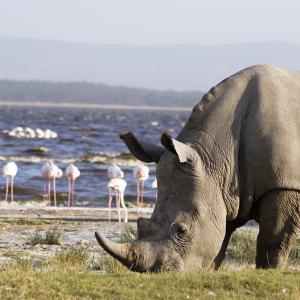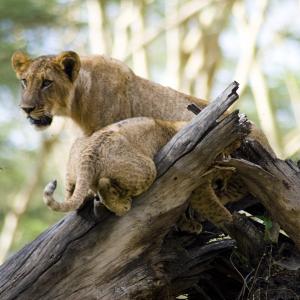“A beautiful wildlife haven”

The ultimate Kenya safari
Sunk deep in the cleft of the Great Rift Valley, one of earth’s most phenomenal geological features, ringed by shoals of extinct and dormant volcanoes and presided over by the Menengai Crater, one of the largest craters in the world, lie the turquoise-shimmering waters of Lake Nakuru. Guarded by the prehistoric splendour of a grey-green forest of Euphorbia candelabrum, Lake Nakuru National Park offers sanctuary to some of the world’s most endangered creatures. As a Kenya safari destination, Lake Nakuru ranks as one of the most popular destinations in the Great Rift Valley.
Kenya Safari Fact File
Altitude: 1,756 metres above sea level.
Area: 188 sq km.
Location: Nakuru, Rift Valley Province.
Distance from Nairobi: 140 km northwest of Nairobi
Gazetted: Lake Nakuru was gazetted as a bird sanctuary in 1960 and elevated to status of National Park 8 years later.
Vegetation: 550 plant species and varied woodlands that include: acacia woodlands, Euphorbia and Olea forests.
Climate: The climate is warm and dry.
Fauna: Indigenous mammals include; the rare long-eared leaf-nosed bat, colobus monkey, rock hyrax, hippo, leopard, lion, rhino, waterbuck, impala, gazelle, striped hyena, bat-eared fox, wild cat, reedbuck, vervet monkeys, baboons and golden cat. Re-stocked mammals include: lion, black and white rhino and the endangered Rothschild’s giraffe.
Birds: 450 other species of birds. Up until 2012 before the lake’s water levels tremendously rose, well over 1.5 million flamingos belted its shores.
Roads: The park is well connected by a tarmac road from Nairobi and is networked by accessible, sufficiently passable roads.
The Fabulous Flamingos of the ‘Flamingo Lake.’ ‘The most fabulous bird spectacle in the world’
Roger Tory Peterson
The lake is especially famous for the 1.5 million-strong population of Lesser Flamingo that up until 2012 gathered on its shores to filter the brackish water through their beaks and thus extract the blue-green algae, Spirulina platensis, which proliferates in this unique alkaline aquatic environment. Greater Flamingo also visited the lake, in smaller numbers than their shorter relatives, feeding usually on the lake bottom, up-ended like ducks or stalking in the shallows with heads submerged. For a variety of reasons neither species bred here, though both regularly made nests and indulged in courtship displays.
The millions of fabulous flamingoes have greatly declined in number since 2012 when the lake’s water levels drastically increased. The flamingos are reported to have temporarily migrated to Lake Bogoria. The increase in water levels in Lake Nakuru reduced the salinity of water which in turn reduced algae, the main food for flamingoes.
On the safari trail
Because the Park is so compact, game density is high and wildlife encounters are plentiful. This is also the Park where you are most likely to see a leopard while the high numbers of lion make sightings a real possibility.
In the woodland forests watch out for endangered Rothschild’s giraffe, colobus monkey, rhino and the odd striped hyena. In the bushlands l ook for eland, steenbok, impala and reedbuck while on the cliffs and escarpment you may see dik dik, rock hyrax and klipspringer. On the lake you can enjoy the antics of the small hippo herd whilst on the lakeshore you’ll find numerous waterbuck, reedbuck and zebra. In the southern part of the Park look out for eland, Thomson’s and Grant’s gazelle.
Kenya’s first rhino sanctuary
Established as Kenya’s first rhino sanctuary, the Park now hosts one of the largest black rhino concentrations in the country and substantial numbers of white rhino have also been introduced.
Where to find them: black rhino prefer bushy forested areas and are therefore more difficult to spot. White rhino prefer to graze in open grasslands, especially those around the lakeshore making them very easy to spot.
What to do and see
One of the most popular Kenya safaris destinations, Kenya’s Lake Nakuru offers Kenya lodge safaris, Kenya camping safaris, Kenya safari camps, family safaris. Lake Nakuru accommodation options include: Sarova Lion Hill, The Lake Nakuru Hotel, The Lake Nakuru Lodge and the Great Rift Valley Lodge
| Economy | Lake Nakuru Lodge |
| Comfort | Sarova Woodlands, The Pelican Lodge, Sentrim Elementaita |
| Luxury | Sarova Lion Hill, Lake Nakuru Sopa, Flamingo Hill Camp |


